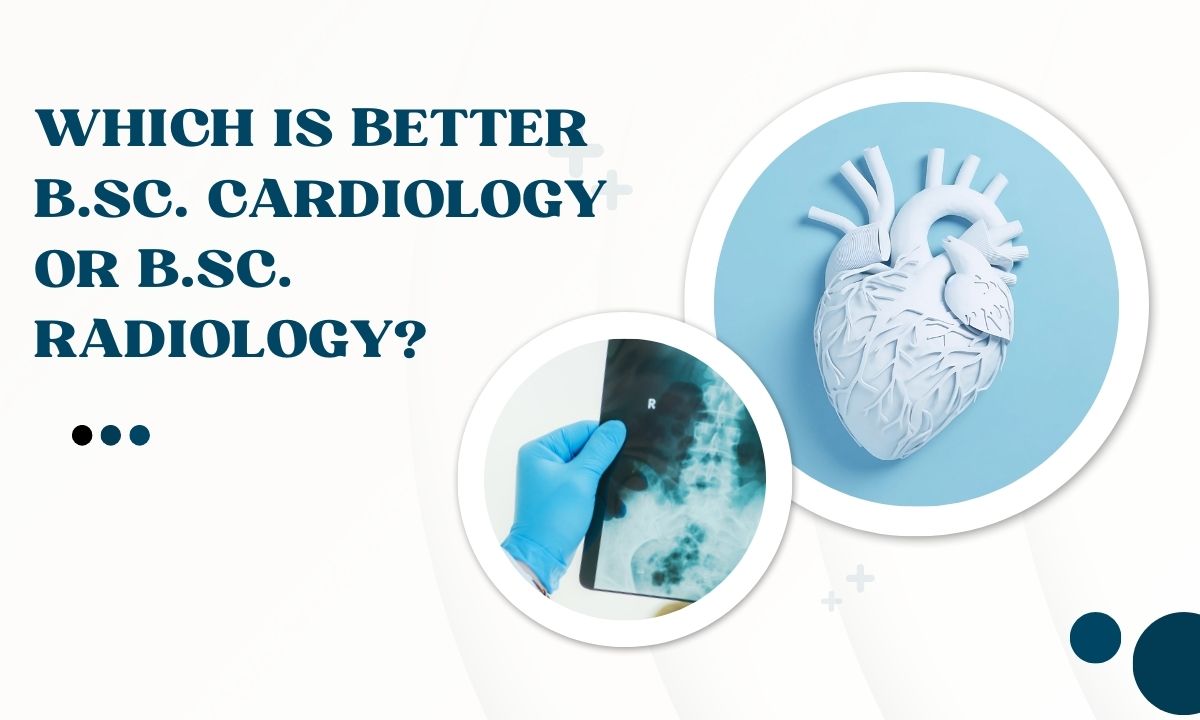In the dynamic and complex field of healthcare, aspiring students are often faced with a plethora of options when it comes to pursuing specialized undergraduate degrees. Of all the currently trending programs in their sector, B.Sc. Cardiology and B.Sc. Radiology emerge as really popular courses. Both science programs provide students with knowledge and skills relevant for application in both patient care and medical technology, within contrasting scopes of clinical practice. Hence, this essay examines these two degrees and discusses the similarities and differences within the curriculum, career opportunities, scope of practice, and personal fulfillment to find which might be more suitable for students in India.
Understanding B.Sc. Cardiology and B.Sc. Radiology
B.Sc. Cardiology is largely related to the study of the heart, the vascular system, and associated biomedical technology as a whole. The modules commonly found in this B.Sc program would typically cover human anatomy, physiology, biochemistry, cardiac pathology, and diagnostic procedures that relate to cardiology. The students learn specialized techniques concerning diagnosing and managing heart diseases and how to properly support the patient at all stages of cardiovascular conditions.
Meanwhile, B.Sc. Radiology revolves around imaging techniques and technologies in diagnosing diseases. It consists of subjects like radiologic physics, imaging modalities (X-ray, MRI, CT scan, and ultrasound), and patient care practices. Radiology technologists would play an important role in image acquisition, patient safety, and provision of essential support to radiologists and other healthcare professionals.
| B.Sc. in Cardiology | B.Sc. in Radiology |
|
|
Curriculum and Skill Development
The curriculum in both programs is rigorous but varies significantly in focus. Students pursuing B.Sc. Cardiology engage with subjects that emphasize the heart’s functioning, diseases, and treatment. They learn to interpret cardiac tests such as ECGs and echocardiograms and often gain hands-on experience through clinical rotations in cardiac departments. In contrast, the B.Sc. Radiology curriculum hones in on various imaging techniques and the technology behind them. Students become adept at preparing patients for procedures, operating imaging equipment, and understanding the implications of the images produced. They are trained to ensure that radiologic procedures are conducted safely and effectively, with a strong emphasis on radiation safety and patient care.
Both degrees require a solid foundation in biology, chemistry, and physics, but they churn out professionals with different skill sets focused on distinct aspects of healthcare.
Career Opportunities and Scope of Practice
Considering careers, both B.Sc. Cardiology and B.Sc. Radiology have promising avenues for independent careers in the health system.
A graduate with a B.Sc. in Cardiology can work as a cardiac technologist by performing various diagnostic tests and procedures. Their jobs may also be found in hospitals, clinics, research institutes, and rehabilitation centers, with special reference to echocardiography, stress testing, and electrophysiology. Further study could lead to specializations such as cardiac rehabilitation or certification as a technical specialist.
On the other hand, a B.Sc. in Radiology allows a person to become a radiologic technologist or radiographer. They may also specialize as an MRI technologist, CT technologist, ultrasound technician, or radiation therapy technologist after further training. The demand for support staff for radiologists is always on the increase and the future seems bright with respect to job opportunities as imaging has become the preferred mode of diagnosis.
Both careers become lucrative but diversity lies in experience and specialization. Generally, salaries of radiologic technologists depend on the area of specialization in imaging and geography of where they practice. Conversely, cardiac technologists are slowly rising to be recognized and appreciated for their specialized skills; hence, a favorable salary assures them too.
Professional Satisfaction and Influence
The career decision between B.Sc. Cardiology and B.Sc. Radiology has to do with the preference for and fulfillment of patient care. For example, individuals who are drawn to cardiac patients’ hearts are usually interested in procedures that take hands-on efforts to improve patient outcomes. The degree provides practitioners a deep relationship with patients while making them part of the journey to recovery from and management of chronic diseases.
By contrast, a person choosing radiology may enjoy the technical side of health care. They are at times the unsung heroes of physicians because radiology professionals ensure accurate diagnosis and management plans. Their efforts allow doctors to make decisions based on imaging results. But rapid-fire new developments in imaging technology promise that a career in radiology will probably remain mentally demanding and growing, making it attractive to those interested in technology and innovation.
Conclusion
Ultimately, the decision between B.Sc. Cardiology and B.Sc. Radiology depends on individual interests, strengths, and career aspirations. If a student is passionate about the heart and wishes to engage deeply with patients suffering from cardiovascular issues, a B.Sc. Cardiology may be the better choice. In contrast, if a student is inclined towards technology and imaging sciences, with a desire to play a key role in diagnostics, then B.Sc. Radiology would be a suitable option.
Considerations
- Interest: Are you more fascinated by the cardiovascular system and heart diseases (Cardiology) or diagnostic imaging and technology (Radiology)?
- Job Market: Research the job availability and demand for each field in your region. Consider speaking to professionals already working in both sectors for insights.
- Further Studies: If you plan eventually to specialize further (like pursuing an MD), consider the pathways available after each degree.
- Work Environment: Think about whether you prefer a clinical setting, direct patient interaction, or a more technology-focused environment.
Both educational paths hold promising future prospects, but they cater to different interests and professional experiences. Consequently, students should reflect on their preferences, strengths, and career goals before making a choice. With the right approach and dedication to their chosen field, both cardiology and radiology graduates can make invaluable contributions to the healthcare system in India, ultimately improving patient care and outcomes.

